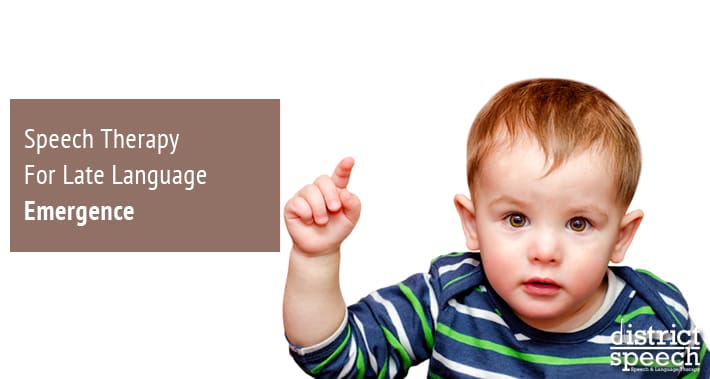
You might want to rush out to speak with a speech therapist for kids if your child is a couple weeks behind in reaching their speech related developmental milestones.
But every child develops at their own pace.
So long as they don’t fall too far behind but they’re still making progress, it’s okay.
In some cases, however, it might be related to a speech or language disorder.
One of these disorders is called late language emergence (LLE).
If your child is experiencing delayed language skills due to LLE, early intervention speech and language therapy can help catch them up to their peers.
Let’s take a look at late language emergence – what is it, what causes it, and how speech therapy can help.
What Is Late Language Emergence?
Late language emergence is usually diagnosed in children between age two and four.
It happens when they have a delay in their language skills without any other disabilities or developmental delays.
Late language emergence can sometimes be an indicator of a language impairment as well.
With proper treatment from a speech pathologist, most children with LLE will catch up to their peers.
Late Language Emergence Symptoms
If your child has late language emergence, your speech therapist will usually determine this by asking you about their vocabulary.
For normal development, your child needs to have at least fifty words in their vocabulary.
They also need to be able to make combinations of at least two words.
They need to be able to do both by the time they’re two years old.
Other things to look out for in your child include:
- Your child struggles to use body language (like gestures) to communicate
- Your child comprehends fewer words than expected at their age
- Your child uses less complex words than you’d expect at their age
- Your child uses shorter sentences that are less grammatically correct than you’d expect at their age
If your child shows these signs, your speech therapist will attempt to rule out other conditions as well.
The above symptoms are also signs your child may need:
- Speech and language therapy for hearing impaired children
- Autism spectrum disorder speech therapy
- Speech and language therapy for selective mutism
- And others
What Causes Late Language Emergence?
We don’t currently know what causes late language emergence.
However, there are some known risk factors.
For example, boys are at a higher risk for developing late language emergence than girls.
Premature babies and kids with delayed development of their gross motor skills and fine motor skills are also at higher risk.
Your child might be more likely to develop late language emergence if you have a family history of it.
If you notice your child has risk factors for LLE, there are ways you can decrease their risk.
Some of the best ways to decrease your child’s risk of LLE include:
- Reading to them every day
- Providing lots of play opportunities
- Providing opportunities for them to socialize with other kids
How Can A Speech Therapist Help?
There are a few ways your child’s speech therapist can help with their late language emergence.
Speech therapists can help in direct ways, like working directly with your child, and indirect ways, like working with you or your child’s other caregivers.
Your child’s speech therapist may use just one of these methods or a combination of methods, depending on the needs of your child.

1. Working With Your Child’s Caregivers
Your pediatric speech therapist will start by understanding your concerns and hopes for your child.
Your child’s speech therapist will likely also want to talk to you about your priorities and goals for your child, your child’s strengths and needs, and their interests.
Next, they’ll work with you to find learning opportunities for your child in your day to day life.
They will also choose which intervention techniques will be most effective.
2. Direct Intervention Approaches
Direct intervention happens when your child’s speech therapist works directly with them.
It lets your child’s speech therapist set developmentally appropriate goals that will improve their communication as well as their social and academic skills.
One example of a direct intervention approach is something called dialogic reading.
In dialogic reading, your child’s speech therapist will read with them.
Next, they will ask your child questions, and engage in discussion about the book while they read together.
3. Indirect Intervention Approaches
Indirect intervention is where you can help.
The goal with indirect intervention is to teach you how to support your child’s communication.
Your child’s speech therapist will teach you activities and interventions to practice with your child at home.
These can include activities like reading or play groups.
It can also include different forms of communication, like helping you to introduce gestures, signs, and pictures for your child to use at home.
Your speech therapist may also teach you about:
- Modeling language for your child
- Modeling nonverbal communication
- Mirroring your child’s actions and words
- Offering support to your child as they attempt to communicate
- Giving your child adequate time to respond
Book Your Appointment With District Speech Today
Being late on speech milestones doesn’t have to be a stressful experience for you or your child.
Every child develops in their own time, and some children just need more support than others.
At District Speech, our experienced speech therapists for children can be that support.
Book your appointment with District Speech today.
1300 I St NW, Suite 400 E,
Washington, DC 20005
- https://g.page/districtspeech
District Speech and Language Therapy specializes in speech therapy, physical therapy, and occupational therapy solutions, for both children and adults, in the Washington D.C and the Arlington Virginia areas.